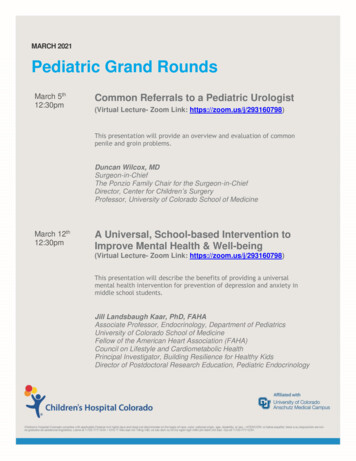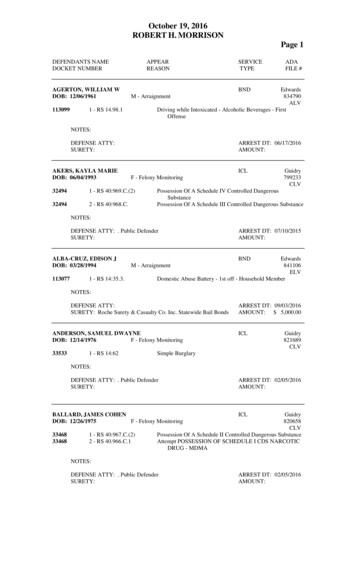
Transcription
APRIL 1 , 201 334567A MEANINGFUL LIFEIS POSSIBLE
345676Vol. 134, No. 7SemimonthlyENGLISHTHIS MAGAZINE, The Watchtower,honors Jehovah God, the Ruler ofthe universe. It comforts peoplewith the good news that God’sheavenly Kingdom will soon end allwickedness and transform the earthinto a paradise. It promotes faithin Jesus Christ, who died so thatwe might gain everlasting life andwho is now ruling as King of God’sKingdom. This magazine has beenpublished continuously since 1879and is nonpolitical. It adheres tothe Bible as its authority.(Printing Each Issue:44,978,000 IN 205 LANGUAGES APRIL 1, 2013COVER SUBJECTIs a Meaningful LifeReally Possible? PAGE 3JESUS—THE KEY TO A MEANINGFUL LIFE 4A MEANINGFUL LIFE—JESUS SHOWS THE WAY 6ALSO IN THIS ISSUEThe Bible Changes Lives 8Did You Know? 10Would you welcomemore information or afree home Bible study?Draw Close to God—“Keep On Asking, and It Will Be Given You” 11Imitate Their Faith—He “Walked With the True God” 12Bible Questions Answered 16Visit www.jw.orgor send your request to oneof the addresses below.For the UNITED STATES OF AMERICA:Jehovah’s Witnesses25 Columbia HeightsBrooklyn, NY 11201-2483For CANADA:Jehovah’s WitnessesPO Box 4100Georgetown, ON L7G 4Y4(sREAD MORE ONLINE www.jw.orgFREQUENTLY ASKED QUESTIONS ABOUTJEHOVAH’S WITNESSES—What Is a BibleStudy?For a complete list of worldwide addresses,see www.jw.org/contact.(Look under ABOUT US/FREQUENTLY ASKED QUESTIONS) This publication is not for sale. It is providedas part of a worldwide Bible educational worksupported by voluntary donations. Unless otherwise indicated, Scripture quotations are fromthe modern-language New World Translation ofthe Holy Scriptures—With References.The Watchtower (ISSN 0043-1087) is publishedsemimonthly by Watchtower Bible and TractSociety of New York, Inc.; L. Weaver, Jr.,President; G. F. Simonis, Secretary-Treasurer;25 Columbia Heights, Brooklyn, NY 11201-2483,and by Watch Tower Bible and Tract Society ofCanada, PO Box 4100, Georgetown, ON L7G 4Y4.Periodicals Postage Paid at Brooklyn, NY, and atadditional mailing offices. POSTMASTER: Sendaddress changes to Watchtower, 1000 Red MillsRoad, Wallkill, NY 12589-3299. 5 2013 WatchTower Bible and Tract Society of Pennsylvania.All rights reserved. Printed in Canada.rAPRIL 1 , 201 334567DOWNLOAD THISMAGAZINE IN VARIOUSFORMATS ONLINEA MEANINGFUL LIFEIS POSSIBLE
COVER SUBJECTIs a Meaningful LifeReally Possible?“The length of our days is seventy years—or eighty, if we have the strength; yet theirspan is but trouble and sorrow.”—Psalm 90:10, New International Version.OW true those words are! Life in this world is so oftenglutted with “trouble and sorrow.” Perhaps you havewondered, ‘Is it even possible to have a truly meaningfullife now?’Take, for example, Maria. She was always a very activeperson, but now, at the age of 84, she has become practically housebound. She is mentally active, but her body, itseems, no longer cooperates. How can she possibly feelthat such a life is meaningful?How about you? You may at some time have asked yourself whether your life is meaningful. Your work may be repetitive, tiring, and tedious. Your efforts or work may notbe recognized. Even if you do have a measure of success,you may feel insecure regarding your future. At times, youmay also feel lonely or depressed. Your family life may bemarked by conflict and strife. You may have lost a loved one in death. A man named Andre was very close to his fa ther, who suddenly fell ill and died. For Andre, it was a terrible blow, and it left a void that he feels will never be completely filled.No matter what trouble we may face, there is somethingwe desperately need to know: Is a meaningful life reallypossible? We can find the answer in the life of a man whowalked the earth some 2,000 years ago—Jesus Christ. Inspite of all the obstacles that confronted him, Jesus trulyhad a meaningful life. So can we if we follow his example.HAPRIL 1, 2013 3
JesusTHE KEY TO A MEANINGFUL LIFEID Jesus really have a meaningful life? He ev- (John 4:6) He had trekked through the hilidently was brought up in humble surround- ly country of Samaria all morning, so he sureings, and throughout his life he had few of this ly was hungry. In fact, his disciples had urgedworld’s goods. He actually had “nowhere to lay him: “Rabbi, eat.” (John 4:31) By his answer, Jedown his head.” (Luke 9:57, 58) In addition, he sus indicated that he really felt nourished andwas hated, slandered, and finally put to death by strengthened by doing God’s work. Does thathis enemies.not sound like the kind of man whose life hadYou may reason, ‘Such a life is not what I think meaning?of as meaningful!’ But there is more to Jesus’ lifethat we do well to consider. Let us examine four 2. JESUS HAD INTENSE LOVE FOR HIS FATHER.aspects of his life.“I love the Father.”—John 14:31.D1. JESUS HAD A PURPOSE IN LIFE—TO DO GOD’S WILL.“My food is for me to do the will of him thatsent me.”—John 4:34.By his words and actions, Jesus sought to fulfill the will of his heavenly Father, Jehovah.1 Jesus found great joy in doing God’s will. He actually compared doing so to food, as is shownin the scripture just quoted. Consider the circumstances under which he made that comparison.Jesus spoke those words at about noontime.1 Jehovah is the name of God as revealed in the Bible.4 THE WATCHTOWERJesus had an extremely close relationship withhis Father in heaven. Jesus’ deep love for Godimpelled him to make known his Father—Hisname, purposes, and qualities. Through hiswords, actions, and attitudes, Jesus perfectly reflected his Father—to the point that we see in Jesus a living portrait of his Father. Thus, whenPhilip asked Jesus: “Show us the Father,” Jesusreplied: “He that has seen me has seen the Father also.”—John 14:8, 9.Jesus loved his Father so much that he waswilling to obey him to the point of death. (Philippians 2:7, 8; 1 John 5:3) Such an intense love forGod filled Jesus’ life with meaning.
3. JESUS LOVED PEOPLE.“No one has love greater than this, that someone should surrender his soul in behalf of hisfriends.”—John 15:13.Our future life prospects as imperfect humans are admittedly grim. The Bible explains:“Through one man [Adam] sin entered into theworld and death through sin, and thus deathspread to all men because they had all sinned.”(Romans 5:12) We cannot on our own escapethe consequence of sin, namely death.—Romans6:23.Thankfully, Jehovah lovingly provided a solution to mankind’s situation. He allowed his perfect and sinless Son, who became known as Jesus, to suffer and die in order to provide theransom needed to deliver mankind from slaveryto sin and death. Jesus, moved by love for hisFather and for humans, willingly complied andgave his perfect human life in our behalf. (Romans 5:6-8) Such unselfish love gave meaning tohis life.14. JESUS KNEW THAT HE HAD HIS FATHER’SLOVE AND APPROVAL.“This is my Son, the beloved, whom I have approved.”—Matthew 3:17.Jehovah spoke those words from heaven atthe time of Jesus’ baptism. Jehovah thus openly expressed affection for and approval of hisSon, Jesus. No wonder Jesus could emphaticallysay: “The Father loves me”! (John 10:17) Knowing that he had his Father’s love and approval,Jesus faced opposition and criticism with confidence. He even maintained balance and emotional stability in the face of death. (John 10:18)Jesus’ sense of his own Father’s love and approval undoubtedly gave even greater meaning to hislife.Jesus certainly had a meaningful life. Clearly,we can learn much from him about how we canlead a life that has real meaning. The next articlewill consider some of the clear advice that Jesusgave his followers about how to live.1 To learn more about the ransoming value of Jesus’ death, seechapter 5 of the book What Does the Bible Really Teach? publishedby Jehovah’s Witnesses.APRIL 1, 2013 5
A Meaningful LifeJESUS SHOWS THE WAY“Walk just as Jesus walked.”—1 John 2:6, NET Bible.S WE discussed in the preceding article, Jesus led a meaningful life. So if we want to fillour life with meaning, we do well to imitate hisexample and listen to his advice.Jehovah, in fact, urges us to do just that, as theabove scripture shows. Walking as Jesus walkedinvolves patterning our entire way of life after hisexample and teachings. Doing so will help us togain God’s approval and have a meaningful life.Jesus’ teaching included principles that canhelp us to walk just as he walked. We find a number of these principles in his famous Sermon onthe Mount. Let us consider a few of the principles and how we can apply them in our life.APRINCIPLE: “Happy are those conscious oftheir spiritual need.”—Matthew 5:3.HOW THE PRINCIPLE CONTRIBUTES TO A MEANINGFUL LIFE: Jesus indicated that humans havean innate spiritual need. We long to know the answers to such questions as these: Why are wehere? Why is there so much suffering on thisearth? Does God really care about us? Is there lifeafter death? We need to know the answers tosuch questions in order to have a meaningful life.Jesus knew that there is only one reliable sourcethat can answer those questions—God’s Word. Inprayer to his Father, Jesus said: “Your word istruth.” (John 17:17) Can God’s Word really helpus to satisfy our spiritual need?REAL-LIFE EXAMPLE: As the lead singer of a popular band, Esa was well on his way toward becoming a rock star. Even so, Esa felt that something was missing. “Although I enjoyed being inthe band, I longed for more meaning in my life,”he says. In time, however, Esa came in contact6 THE WATCHTOWERwith one of Jehovah’s Witnesses. “I bombardedhim with questions,” Esa admits. “His logical,Scriptural answers intrigued me, so I agreed tohave him study the Bible with me.” What Esalearned from his study of the Bible touched hisheart and moved him to dedicate his life to Jehovah. “In the past, I constantly drifted in and outof problems and crises,” he says. “Now I have areal purpose in life.”1PRINCIPLE: “Happy are the merciful.”—Matthew 5:7.HOW THE PRINCIPLE CONTRIBUTES TO A MEANINGFUL LIFE: Mercy involves showing compas-sion to others, being kind and considerate toward them. Jesus showed mercy to those in need.Moved by deep compassion, he took the initiative to relieve the suffering of others. (Matthew14:14; 20:30-34) When we imitate Jesus in beingmerciful, we add meaning to our lives, for thosewho show mercy to others are happy as a result.(Acts 20:35) We can show mercy to others by ourkind words and deeds, bringing relief to thosewho need our help. Does showing mercy reallyenhance our well-being?REAL-LIFE EXAMPLE: Maria and her husband,Carlos, are examples of being merciful. Maria’sfather is a widower, and in recent years he hasbecome bedridden. Maria and Carlos have taken him into their home and are looking afterhis every need. They have had many sleeplessnights, even rushing him to the hospital when hehas a diabetic crisis. They admit that they getreally tired at times. But they are happy, just as1 You can read Esa’s story in its entirety on pages 8-9 of thismagazine.
Maria and CarlosJesus said, because they have the deep satisfaction of knowing that they are providing Maria’sfather with the care he needs.PRINCIPLE: “Happy are the peaceable.”—Matthew 5:9.HOW THE PRINCIPLE CONTRIBUTES TO A MEANINGFUL LIFE: To be “peaceable” literally meansto be a “peacemaker.” How does being a peacemaker make life more meaningful? For onething, we enjoy better relationships with thosearound us. We do well to heed the Bible’s advice: “If possible, as far as it depends upon you,be peaceable with all men.” (Romans 12:18) “Allmen” include family members and others whomay not share our beliefs. Can being peaceabletoward “all men” really add meaning to our life?REAL-LIFE EXAMPLE: Consider the experience ofa woman named Nair. Over the years, she hasfaced many pressures that have tested her ability to maintain peace, especially within her ownfamily. Ever since her husband abandoned herabout 15 years ago, shehas been bringing up herchildren on her own. OneNairof her sons had a drugproblem and often became uncontrollable andthreatened her and herdaughter. Nair believesthat what she has learnedfrom the Bible has given her the strength to bepeaceable, even undersuch trying circumstances. She tries not to argueor fight about things. Sheendeavors to be kind, sympathetic, and understanding toward others. (Ephesians 4:31, 32) Sheis convinced that learning to be peaceable hasenabled her to have the best possible relationships with family members and others.TAKING THE FUTURE INTO ACCOUNTIf we follow Jesus’ wise advice, we will findhappiness and contentment in life. For a trulymeaningful life, however, we also need to knowwhat the future holds. After all, how meaningfulcan life be if all we know is that we will eventually grow old, get sick, and then die? Yet, theseare the realities of life in this world.There is, however, good news! Jehovah hasmany blessings in store for all those who endeavor to “walk just as Jesus walked.” Jehovahpromises that he will soon bring about a righteous new world, where faithful humans willlive as Jehovah purposed for them to live—forever in perfect health. His Word says: “Look! Thetent of God is with mankind, and he will residewith them, and they will be his peoples. AndGod himself will be with them. And he will wipeout every tear from their eyes, and death will beno more, neither will mourning nor outcry norpain be anymore. The former things have passedaway.”—Revelation 21:3, 4.Maria, the 84-year-old woman mentioned inthe first article in this series, rejoices in the prospect of seeing those words come true. Whatabout you? Would you like to know more about“the real life”—the one to come under God’sKingdom? (1 Timothy 6:19) If so, you can ask Jehovah’s Witnesses locally or write to the publishers of this magazine.1 ˇ1 The book What Does the Bible Really Teach?, published by Jehovah’s Witnesses, has helped many to make a topical study ofthe Scriptures.APRIL 1, 2013 7
THE BIBLE CHANGES LIVES“My behaviorwas brutal”AS TOLD BY ESA LEINONENYEAR BORN:1960COUNTRY OF ORIGIN:FINLANDHISTORY:HEAVY-METAL MUSICIAN5 Kaj Ewart8 THE WATCHTOWERMY PAST: I grew up in a working-class neighborhood inthe seaport city of Turku. My father was a boxing champion, and my younger brother and I were also actively involved in boxing. In school, I was often challenged to afight; I never hesitated to use my fists. As a teenager, Ijoined a notorious gang, which got me into even more violent conflicts. I also discovered heavy-metal music andstarted to dream of becoming a rock star.I bought some drums, formed a band, and soon becamethe lead singer of the band. I liked to go wild on stage. Because our band was aggressive and had a wild appearance,we gradually received much publicity. We started to playin front of large audiences, and we made a few recordings,the last of which received favorable reviews. In the late1980’s, we traveled to the United States to promote ourband. We performed in New York and Los Angeles a fewtimes and established some contacts with music-industryprofessionals before returning to Finland.Although I enjoyed being in the band, I longed for moremeaning in my life. I became disillusioned with the harshness of the music industry and became frustrated with myfrivolous lifestyle. I felt that I was a bad person, and I wasafraid of burning in a fiery hell. I tried to find some answersin all kinds of spiritual books, and I also prayed intenselyfor God’s help, even though I felt that I could never pleasehim.HOW THE BIBLE CHANGED MY LIFE: To support myself, Iworked at the local post office. One day, I found out thata workmate was one of Jehovah’s Witnesses. I bombarded him with questions. His logical, Scriptural answers intrigued me, so I agreed to have him study the Bible withme. After I had been studying for some weeks, my bandwas offered an attractive recording contract with the possibility of releasing an album in the United States. I feltthat this was the chance of a lifetime.
“Our heavenly Father ismerciful, and he wants toheal the wounds of those whorepent of their mistakes”I told the Witness who was studying with methat I really wanted to make one more album andthat after doing that, I would seriously apply Bibleprinciples in my life. He didn’t express his opinion; he simply asked me to read Jesus’ words recorded at Matthew 6:24. The verse says: “No onecan slave for two masters.” I was stunned when Irealized the meaning of Jesus’ words. But aftera few days, it was my Bible teacher’s turn to bestunned! I told him that because I wanted to follow Jesus, I left the band!The Bible was like a mirror that revealed myflaws to me. (James 1:22-25) I saw that my behavior was brutal: I was proud, full of unquenchable ambition. I used bad language, and I fought,smoked, and drank heavily. When I realized howmuch my lifestyle contradicted Bible principles, Ifelt as if I had run into a brick wall. Nevertheless,I was ready to make the needed changes.—Ephesians 4:22-24.Especially in the beginning, I was over whelmed with remorse for my past wrongs. Butthe Witness with whom I was studying helped mea lot. He showed me what the Bible says at Isaiah1:18: “Though the sins of you people should proveto be as scarlet, they will be made white just likesnow.” This and other Bible verses convinced methat our heavenly Father is merciful and wants toheal the wounds of those who repent of their mistakes.When I came to know and appreciate Jehovahas a Person, I wanted to dedicate my life to him.(Psalm 40:8) I was baptized in 1992 at an international convention of Jehovah’s Witnesses held inSt. Petersburg, Russia.HOW I HAVE BENEFITED: I have made many goodfriends among Jehovah’s worshippers. Now andthen, we get together to play decent music andenjoy this gift from God. (James 1:17) A specialblessing has been my marriage to my belovedwife, Kristina. With her, I have shared manythings—the joys and challenges of life, as well asmy deepest feelings.Had I not become one of Jehovah’s Witnesses,I might not be alive today. In the past, I constantly drifted in and out of problems and crises. NowI have a real purpose in life, and I feel that everything is in place. ˇAPRIL 1, 2013 9
DID YOU KNOW?Why was ancient Nineveh called“the city of bloodshed”?WALL RELIEF OF WARRIORS CARRYINGHEADS OF ENEMY CAPTIVES ANDTHROWING THEM IN A HEAPErich Lessing/Art Resource, NYNineveh was the capital of the Assyrian Empire. It was a mightycity with magnificent palaces and temples, broad streets, andmassive walls. The Hebrew prophet Nahum referred to it as “thecity of bloodshed.”—Nahum 3:1.That was an apt description, for reliefs from Sennacherib’s palace in Nineveh attest to Assyrian cruelty. One depicts a torturerwrenching the tongue out of a prisoner who had been pinned tothe ground. Inscriptions boast that captives were led by cordsattached to hooks piercing their noses or lips. Captive officialswere made to wear around their necks the severed heads of theirkings, like grotesque necklaces.Assyriologist Archibald Henry Sayce describes the barbaritiesthat followed the capture of a town: “Pyramids of human headsmarked the path of the conqueror; boys and girls were burnedalive or reserved for a worse fate; men were impaled, flayed alive,blinded, or deprived of their hands and feet, of their ears andnoses.” ˇWhat was the purpose of putting a parapetaround the rooftops of Jewish houses?The Jews were commanded by God: “In case you build a newhouse, you must also make a parapet for your roof, that youmay not place bloodguilt upon your house because someone . . .might fall from it.” (Deuteronomy 22:8) The parapet was a necessary safety measure, since Jewish families in Bible times madegood use of their rooftops.Most Israelite homes had a flat roof. The housetop was anideal place for people to linger in the warmth of the sun, enjoythe air, or do domestic chores. In summer, it was a comfortableplace to sleep. (1 Samuel 9:26) A farmer would use the rooftopto dry grain prior to milling or to dry figs and raisins.—Joshua 2:6.The rooftop was also used for worship, both true and idolatrous. (Nehemiah 8:16-18; Jeremiah 19:13) The apostle Peterwent up to the rooftop at noontime to pray. (Acts 10:9-16) If shaded by vines or palm leaves, a housetop must have been a pleasant retreat.The work The Land and the Book says that Israelite homes hada stairway or ladder to the rooftop, “outside of the house, butwithin the exterior court.” So a householder could leave the rooftop without having to enter the house. This may explain Jesus’warning about the urgency of fleeing a doomed city: “Let the manon the housetop not come down to take the goods out of hishouse.”—Matthew 24:17. ˇ10 THE WATCHTOWER
DRAW CLOSE TO GOD“Keep On Asking, and ItWill Be Given You”“Lord, teach us how to pray.” (Luke 11:1) That request was put to Jesus by one of his disciples.As part of his response, Jesus related two illustrations that teach us how to pray and be heardby God. If you have ever wondered whether Godhears your prayers, you will be interested in Jesus’reply.—Read Luke 11:5-13.The first illustration focuses on the one whoprays. (Luke 11:5-8) In the story, a man receivesa guest late at night and has no food to set before him. To the host, the matter is urgent. Despitethe hour, he goes to a friend’s house in order toborrow some bread. At first, the friend is reluctantto get up because his family is fast asleep withhim. But with unembarrassed persistence, the determined host keeps asking until finally his friendgets up and gives him some provisions.1What does the illustration teach us aboutprayer? Jesus is telling us that we need to bepersistent—to keep asking, seeking, and knocking. (Luke 11:9, 10) Why? Is Jesus suggesting thatwhen we pray we are, in effect, pounding at thedoor of a reluctant God? No. Jesus’ point is thatunlike the hesitant friend, God is eager to grantthe proper requests of those who pray in faith. Weshow such faith by our persistence. By repeatedly asking, we reveal that we really need what weare asking for and that we truly believe that Godcan grant it—if that is his will.—Mark 11:24; 1 John5:14.The second illustration focuses on the “Hearer of prayer,” Jehovah. (Psalm 65:2) Jesus asks:1 Jesus’ illustration reflects real-life customs and practices. TheJews viewed showing hospitality as a sacred duty. A family bakedenough bread for a day, so borrowing was common if the supplyran out. Also, if they were poor, the whole family slept on the floorin a single room.“Which father is there among you who, if his sonasks for a fish, will perhaps hand him a serpent instead of a fish? Or if he also asks for an egg, willhand him a scorpion?” The answer is obvious—nocaring father gives harmful things to his children.Then, Jesus applies the illustration: If imperfecthuman fathers “give good gifts” to their children,“how much more so will the Father in heaven giveholy spirit”—the best of gifts—to his earthly childrenwho ask him!1—Luke 11:11-13; Matthew 7:11.God is eager to grant theproper requests of thosewho pray in faithWhat does this illustration teach us about Jehovah, the “Hearer of prayer”? Jesus invites us tosee Jehovah as a caring Father who is eager to respond to the needs of his children. Hence, Jehovah’s worshippers can feel free to approach himwith the requests of their heart. And knowing thathe wants what is best for them, they can readilyaccept his answer to their request, even if the answer is not what they expected.2 ˇ1 Jesus often used a “how much more so” line of reasoning—arguing from the lesser to the greater. One scholar explains: “Theargument runs, ‘If A is true, then how much more will B be truealso.’ ”2 To learn more about how to pray and be heard by God, seechapter 17 of the book What Does the Bible Really Teach? published by Jehovah’s Witnesses.SUGGESTED BIBLE READING FOR APRILLuke 7-21
IMITATE THEIR FAITH NOAHHe “Walked Withthe True God”OAH straightened his back and stretchedhis aching muscles. Picture him seated ona broad wooden beam, taking a moment’s restfrom his work as he looked out over the immensestructure of the ark. The pungent smell of hot tarwas in the air; the sounds of woodworking toolsreverberated. From where he sat, Noah could seehis sons hard at work on various parts of thegreat network of timbers. His sons, their wives,and his own dear wife had all been laboring withhim on this project for decades now. They hadcome a long way, but they had a long way to go!The people of the region thought that all ofthem were fools. The more the ark took shape,the more the people laughed at the very thoughtof a deluge that would cover the whole earth.The disaster that Noah kept warning them aboutseemed so far-fetched, so preposterous! Theycould hardly believe that a man would waste hislife—and the lives of his family—in such a foolishendeavor. However, Noah’s God, Jehovah, sawthe man in a very different light.God’s Word says: “Noah walked with the trueGod.” (Genesis 6:9) What did that mean? Notthat God walked on earth, nor that Noah somehow went to heaven. Rather, Noah obeyed hisGod so closely and loved him so dearly that it wasas if he and Jehovah walked together as friends.Thousands of years later, the Bible said of Noah:“Through [his] faith he condemned the world.”(Hebrews 11:7) How was that so? What can wetoday learn from his faith?N12 THE WATCHTOWERA FAULTLESS MAN IN A TWISTED WORLDNoah grew up in a world that was rapidly goingfrom bad to worse. It had been bad in the days ofhis great-grandfather Enoch, another righteousman who walked with God. Enoch had foretoldthat a day of judgment was coming upon the ungodly people of the world. Now, in Noah’s day,the moral climate was far worse. In fact, fromJehovah’s viewpoint, the earth was ruined, forit was filled with violence. (Genesis 5:22; 6:11;Jude 14, 15) What had happened to make thingsso much worse?A terrible tragedy unfolded among God’s spirit sons, the angels. One of them had already rebelled against Jehovah, becoming Satan the Devil by slandering God and luring Adam and Eveinto sin. In Noah’s day, other angels began to revolt against Jehovah’s just rule. Forsaking theirGod-given station in heaven, they came to earth,assumed human form, and took beautiful women as their wives. Those proud, selfish rebelangels were a poisonous influence among humans.—Genesis 3:1-5; 6:1, 2; Jude 6, 7.Further, the unnatural unions between materialized angels and human women produced hybrid sons of extraordinary size and strength. TheBible calls them Nephilim, which literally means“Fellers”—those who cause others to fall. Viciousbullies, the Nephilim intensified the world’s brutal, ungodly spirit. Little wonder that in the viewof the Creator, “the badness of man was abundant in the earth and every inclination of the
thoughts of his heart was only bad all the time.”Jehovah determined that he would wipe outthat wicked society within 120 years.—Genesis 6:3-5.Imagine trying to raise a family in such aworld! Yet, Noah did so. He found a good wife.After Noah turned 500 years of age, his wife borehim three sons—Shem, Ham, and Japheth.1 Together, the parents had to protect their boys fromthe vile influences surrounding them. Little boystend to be filled with awe and admiration for“mighty ones” and “men of fame”—and the Nephilim were just that. Noah and his wife could hardly shield the children from every report about theexploits of those giants, but they could teach theappealing truth about Jehovah God, the one whohates all wickedness. They had to help their boyssee that Jehovah felt hurt by the violence and rebellion of the world.—Genesis 6:6.Parents today may well sympathize with Noahand his wife. Our world is likewise poisoned byviolence and rebelliousness. Even entertainmentdirected at children may be saturated with suchthemes. Wise parents do all they can to countersuch influences by teaching their children aboutthe God of peace, Jehovah, who will one daybring all violence to an end. (Psalm 11:5; 37:10,11) Success is possible! Noah and his wife succeeded. Their boys grew up to be good men, and1 People in those early days lived far longer than we do today.Their longevity evidently had to do with their being closer to thevitality and perfection that Adam and Eve once had but lost.they married wives who were likewise willing toput the true God, Jehovah, first in their lives.“MAKE FOR YOURSELF AN ARK”One day, Noah’s life changed forever. Jehovahspoke to this beloved servant and told him ofHis purpose to bring the world of that time to anend. God commanded Noah: “Make for yourselfan ark out of wood of a resinous tree.”—Genesis6:14.This ark was not a ship, as some assume. Ithad neither bow nor stern, keel nor rudder—nobends or curves. It was basically a great chest,or box. Jehovah gave Noah the precise dimensions of the ark, some details regarding its design, and directions to coat it inside and out withtar. And he told Noah why: “Here I am bringingthe deluge of waters upon the earth . . . Everything that is in the earth will expire.” However,Jehovah gave this direction to Noah: “You mustgo into the ark, you and your sons and your wifeand your sons’ wives with you.” Noah was alsoto bring representatives of all kinds of animals.Only those aboard the ark could survive the coming Deluge!—Genesis 6:17-20.Noah faced a gigantic task. This ark was to beenormous—some 437 feet (133 m) long, 73 feet(22 m) wide, and 44 feet (13 m) tall. It was farlarger than the largest seagoing wooden shipsbuilt even in modern times. Did Noah back offfrom this assignment, complain about its challenges, or alter the details to make it easier onhimself? The Bible answers: “Noah proceeded toNoah and hiswife had toprotect theirchildren frombad influences
do according to all that God had commandedhim. He did just so.”—Genesis 6:22.The work took decades, perhaps 4
you may feel insecure regarding your future. At times, you may also feel lonely or depressed. Your family life may be marked by conflict and strife. You may have lost a loved oneindeath.AmannamedAndr ewasveryclosetohisfa-ther,whosuddenlyfellilland died.ForAndr e,it wasater-ribleblow,and it left avoidthat he feelswillneverbe com-pletely .










